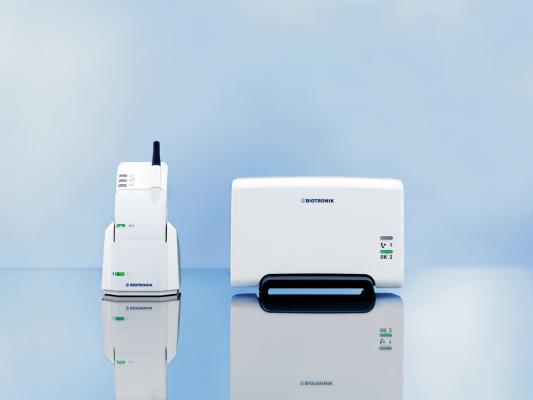
Biotronik Home Monitoring
September 26, 2013 – Biotronik announced the highly-anticipated results of the Reform study. The study demonstrates that ICD (implantable cardioverter-defibrillator) patients with Biotronik's Home Monitoring can enjoy a reduction in follow-up visits by 58 percent. This in turn leads to patients reporting enhanced quality of life.
"The number of patients with an ICD is rapidly increasing, and the burden of frequent, necessary follow-ups falls on patients, physicians and hospitals," explained Gerhard Hindricks, M.D., Heart Center, University Leipzig, Germany. "Reform shows an impressive reduction in follow-up visits with Biotronik Home Monitoring, and is the first trial to indicate that longer intervals between follow-ups contribute to an improved quality of life."
Reform is a prospective, international, multi-center, randomized study investigating the effects of standard 3-month and 12-month follow-up schemes. 155 ICD patients with MADIT-II indications were randomized into two groups. Both received remote follow up via Biotronik Home Monitoring with fully automated daily data transmission and physician alerts of clinically relevant events. Compared to the group receiving quarterly follow-ups, the number of visits per patient per year could be reduced in the group with yearly follow-ups from 3.85 to 1.60, i.e. by 58 percent.
"The Reform trial demonstrates that, thanks to Biotronik Home Monitoring, one-year intervals between follow-up visits in primary prevention ICD patients do not compromise safety in any way. Again, this leads to enhanced patient quality of life, as patients feel less ill and less distracted from normal life, as well as a reduced workload for physicians. On the strength of remote monitoring information, they can decide if a follow-up is necessary," Hindricks commented, adding that in many cases, an in-office follow-up is not needed at all.
The Reform study's findings are in agreement with results from other trials like the landmark trial TRUST1,2, which showed a 45 percent reduction of in-office follow-ups and earlier detection of clinically relevant events.
"The simplicity, efficiency, and effectiveness of Biotronik Home Monitoring and its positive impact on patients' quality of life is backed up by the greatest number of studies available for remote monitoring systems," explained Christoph Böhmer, President International of Biotronik.
References
1 Varma et al., Circulation 2010, 122, 325–332.
2 Varma et al., Circ Arrhythm Electrophysiol 2010, 3:428–436.


 January 05, 2026
January 05, 2026 









